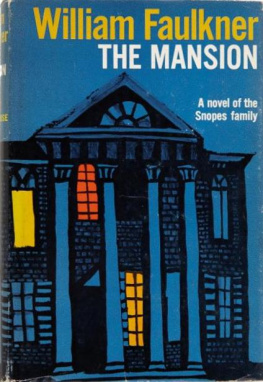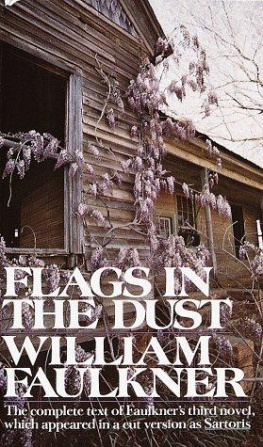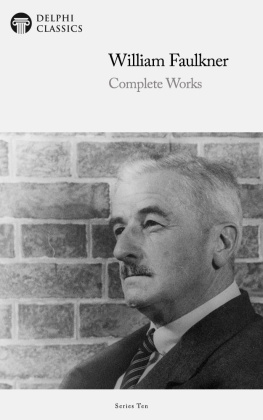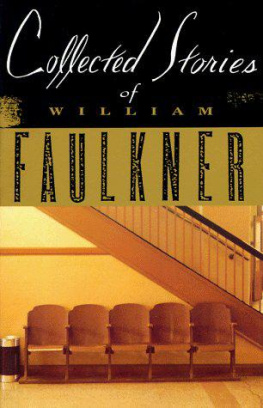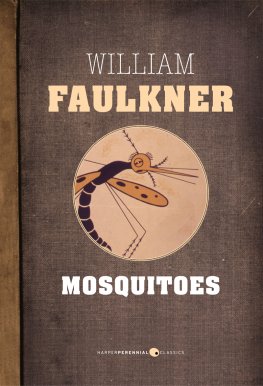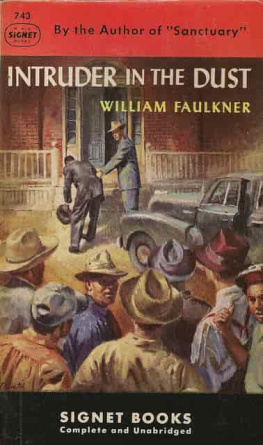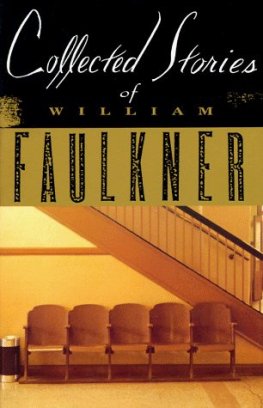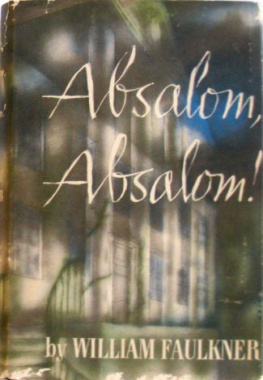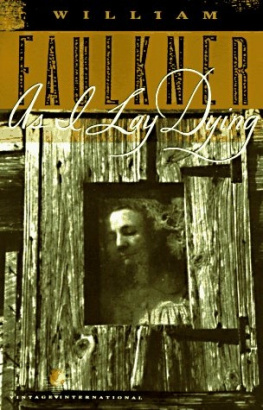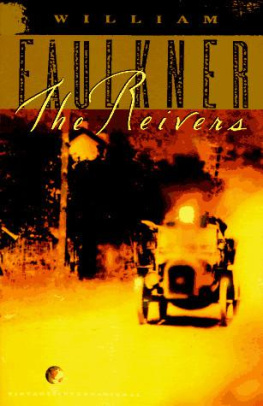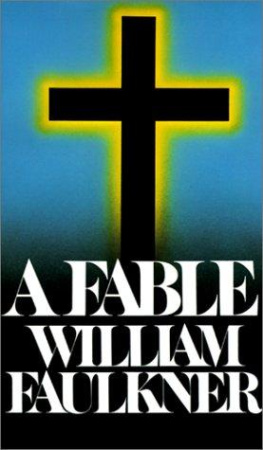William Faulkner - The Essential Faulkner
Here you can read online William Faulkner - The Essential Faulkner full text of the book (entire story) in english for free. Download pdf and epub, get meaning, cover and reviews about this ebook. year: 2015, publisher: Random House, genre: Art. Description of the work, (preface) as well as reviews are available. Best literature library LitArk.com created for fans of good reading and offers a wide selection of genres:
Romance novel
Science fiction
Adventure
Detective
Science
History
Home and family
Prose
Art
Politics
Computer
Non-fiction
Religion
Business
Children
Humor
Choose a favorite category and find really read worthwhile books. Enjoy immersion in the world of imagination, feel the emotions of the characters or learn something new for yourself, make an fascinating discovery.

- Book:The Essential Faulkner
- Author:
- Publisher:Random House
- Genre:
- Year:2015
- Rating:5 / 5
- Favourites:Add to favourites
- Your mark:
- 100
- 1
- 2
- 3
- 4
- 5
The Essential Faulkner: summary, description and annotation
We offer to read an annotation, description, summary or preface (depends on what the author of the book "The Essential Faulkner" wrote himself). If you haven't found the necessary information about the book — write in the comments, we will try to find it.
A collection of the essential works by William Faulkner, the American novelist and short story writer.
Im a failed poet. Maybe every novelist wants to write poetry first, finds he cant and then tries the short story which is the most demanding form after poetry. And failing that, only then does he take up novel writing. - William Faulkner
The Essential Faulkner — read online for free the complete book (whole text) full work
Below is the text of the book, divided by pages. System saving the place of the last page read, allows you to conveniently read the book "The Essential Faulkner" online for free, without having to search again every time where you left off. Put a bookmark, and you can go to the page where you finished reading at any time.
Font size:
Interval:
Bookmark:
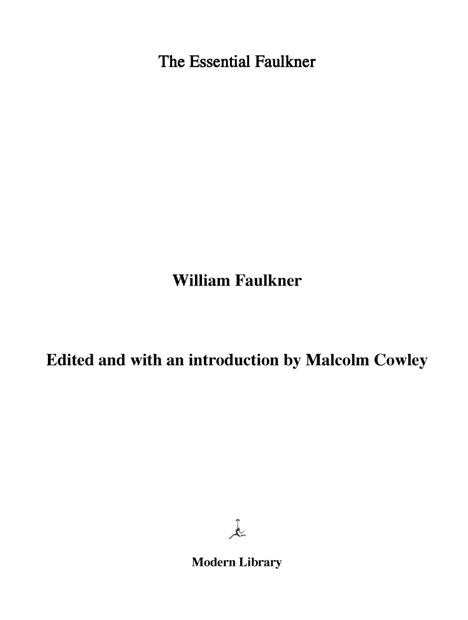
The Essential Faulkner is a work of fiction. Names, characters, places, and incidents either are the product of the authors imagination or are used fictitiously. Any resemblance to actual persons, living or dead, events, or locales is entirely coincidental.
2012 Random House eBook Edition
Copyright 1929, 1931, 1932, 1934, 1935, 1938, 1942, 1950, 1951 by William Faulkner
Copyright 1931, 1939, 1940, 1946 by Random House, Inc.
Copyright 1930, 1934, 1942 by The Curtis Publishing Company
Copyright renewed 1956, 1957, 1958, 1959, 1961 by William Faulkner
Copyright renewed 1958 by The Curtis Publishing Company
Copyright renewed 1963, 1965, 1966 by Estelle Faulkner and Jill Faulkner Summers
Copyright 1946, 1967 by The Viking Press, Inc.
All rights reserved.
Published in the United States by Random House, an imprint of The Random House Publishing Group, a division of Random House, Inc., New York.
R ANDOM H OUSE and colophon are registered trademarks of Random House, Inc.
Originally published in the United States as The Portable Faulkner by Viking Press, a member of Penguin Group USA in 1946 and in the United Kingdom as The Essential Faulkner by Chatto & Windus, a member of the Random House Group, London in 1967.
An earlier version of Part III of the Introduction appeared in the Sewanee Review as part of an essay entitled William Faulkners Legend of the South
eISBN: 978-0-307-79959-3
www.atrandom.com
v3.1
EDITORS NOTE
( FROM Requiem for a Nun)
( FROM Go Down, Moses)
EDITORS NOTE
( FROM The Unvanquished)
( FROM The Unvanquished)
EDITORS NOTE
( FROM Go Down, Moses)
EDITORS NOTE
( FROM The Hamlet)
EDITORS NOTE
( FROM The Sound and the Fury)
EDITORS NOTE
( FROM The Wild Palms)
EDITORS NOTE
( FROM Sanctuary)
( FROM Light in August)
( FROM Go Down, Moses)
EDITORS NOTE
( FROM Requiem for a Nun)
I wrote this introduction in the autumn of 1945, at a time when Faulkners books were little read and often disparaged. He had a few enthusiastic defenders, but no one, so it seemed to me then, had more than distantly suggested the scope and force and interdependence of his work as a whole. I was writing to overcome a general misconception, and that explains why, at various points, my emphasis was different from what it would be today. Yet I find it difficult to change what I said, except in the comparatively simple matter of bringing facts up to date. The original text was written with a good deal of advice from Faulkner himself. It has some historical value, and I prefer to reprint it with a very few revisions, while saving my comments for the end.
When the war was overthe other warWilliam Faulkner went back to Oxford, Mississippi. He had served in the Royal Air Force in 1918. Now he was home again and not at home, or at least not able to accept the post-war world. He was writing poems, most of them worthless, and dozens of immature but violent and effective stories, while at the same time he was brooding over his own situation and the decline of the South. Slowly the brooding thoughts arranged themselves into the whole interconnected pattern that would form the substance of his novels.
The pattern was based on what he saw in Oxford or remembered from his childhood; on scraps of family tradition (the Falkners, as they spelled the name, had played their part in the history of the state); on kitchen dialogues between the black cook and her amiable husband; on Saturday-afternoon gossip in Courthouse Square; on stories told by men in overalls squatting on their heels while they passed around a fruit jar full of white corn liquor; on all the sources familiar to a small-town Mississippi boybut the whole of it was elaborated, transformed, given convulsive life by his emotions; until by simple intensity of feeling the figures in it became a little more than human, became heroic or diabolical, became symbols of the old South, of war and reconstruction, of commerce and machinery destroying the standards of the past. There in Oxford, Faulkner performed a labor of imagination that has not been equaled in our time, and a double labor: first, to invent a Mississippi county that was like a mythical kingdom, but was complete and living in all its details; second, to make his story of Yoknapatawpha County stand as a parable or legend of all the Deep South.
For this double task, Faulkner was better equipped by talent and background than he was by schooling. He was born in New Albany, Mississippi, on September 25, 1897; he was the oldest of four brothers. The family soon moved to Oxford, where he attended the public school, but without being graduated from high school. For a year or two after the war, he was a student at the University of Mississippi, where veterans could then matriculate without a high-school diploma, but he neglected his classroom work and left early in the second year. He had less of a formal education than any other good writer of his time, except Hart Craneless even than Hemingway, who never went to college, but who learned to speak several languages and studied writing in Paris from the best masters. Faulkner taught himself, largely, as he says, by undirected and uncorrelated reading.
Among the authors either mentioned or echoed in his early stories and poems are Keats, Balzac, Flaubert, Swinburne, Verlaine, Mallarm, Wilde, Housman, Joyce, Eliot, Sherwood Anderson, and E. E. Cummings, with fainter suggestions of Hemingway (looking at trout in a river), Dos Passos (in the spelling of compound words), and Scott Fitzgerald. The poems he wrote in those days were wholly derivative, but his prose from the beginning was a form of poetry, and in spite of the echoes it was always his own. He traveled less than any of his writing contemporaries. There was a lonely year spent in New York as salesclerk in a bookstore; there were six months in New Orleans, where he lived near Sherwood Anderson and met the literary crowdhe even satirized them in a bad early novel, Mosquitoesand then six months in Italy and Paris, where he did not make friends on the Left Bank. Except for writing assignments in Hollywood, the rest of his life has been spent in the town where he grew up, less than forty miles from his birthplace.
Although Oxford, Mississippi, is the seat of a university, it is even less of a literary center than was Salem, Massachusetts, during Hawthornes early years as a writer; and Faulkner himself has shown an even greater dislike than Hawthorne for literary society. His novels are the books of a man who broods about literature, but doesnt often discuss it with his friends; there is no ease about them, no feeling that they come from a background of taste refined by argument and of opinions held in common. They make me think of a passage from Henry Jamess little book on Hawthorne:
The best things come, as a general thing, from the talents that are members of a group; every man works better when he has companions working in the same line, and yielding to the stimulus of suggestion, comparison, emulation. Great things of course have been done by solitary workers; but they have usually been done with double the pains they would have cost if they had been produced in more genial circumstances. The solitary worker loses the profit of example and discussion; he is apt to make awkward experiments; he is in the nature of the case more or less of an empiric. The empiric may, as I say, be treated by the world as an expert; but the drawbacks and discomforts of empiricism remain to him, and are in fact increased by the suspicion that is mingled with his gratitude, of a want in the public taste of a sense of the proportion of things.
Font size:
Interval:
Bookmark:
Similar books «The Essential Faulkner»
Look at similar books to The Essential Faulkner. We have selected literature similar in name and meaning in the hope of providing readers with more options to find new, interesting, not yet read works.
Discussion, reviews of the book The Essential Faulkner and just readers' own opinions. Leave your comments, write what you think about the work, its meaning or the main characters. Specify what exactly you liked and what you didn't like, and why you think so.

